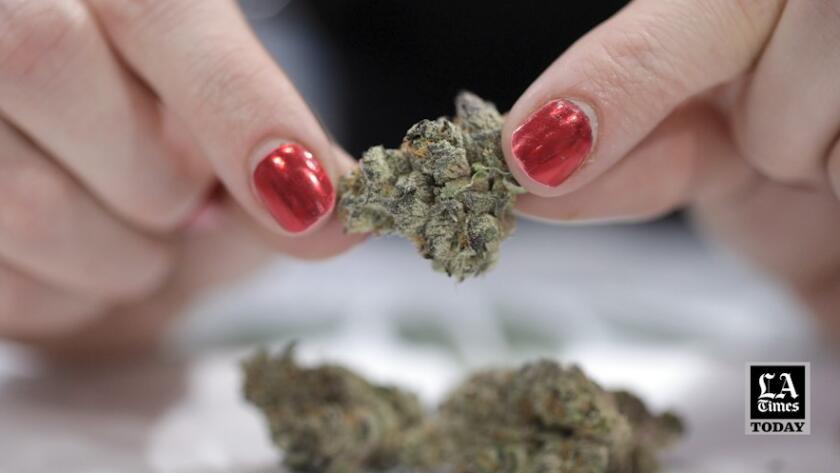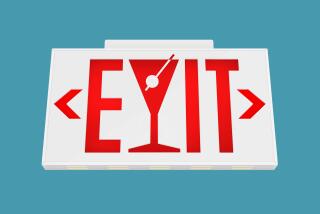Column: Is ‘California sober’ a real thing or an excuse to keep getting high?

It’s not clear who coined the term “California sober.” Or even, really, exactly what it means.
In 2019, the journalist Michelle Lhooq wrote in Vice that she’d given up most recreational drugs except pot and psychedelics and considered herself “Cali sober.”
In 2021, the pop star Demi Lovato, whose highly publicized 2018 heroin and fentanyl overdose caused three strokes and a heart attack and left her with lingering physical problems, released a song called “California Sober.”
“Cashin’ in my chips for forgiveness / Trading in my shame for perspective / Tired of being known for my sickness / It didn’t work, I’m trying something different,” she sang.
“So you’re drinking, smoking a little bit of weed, is that fair to say?” a reporter for CBS Sunday Morning asked the singer while she was promoting her documentary series “Demi Lovato: Dancing With the Devil.”
“Yeah,” replied Lovato. “I think the term that I best identify with is ‘California sober.’ ... I feel the complete abstinent method isn’t a one-size-fits-all solution for everybody.”
A few months later, Lovato changed her tune.
“I no longer support my ‘California sober’ ways,” she wrote on Instagram. “Sober sober is the only way to be.”
I thought about Lovato when I read that the 34-year-old singer Aaron Carter was found dead Saturday at home in Lancaster, the high desert community north of Los Angeles. News reports said a housekeeper found Carter unresponsive in a bathtub. The Los Angeles County coroner’s office is awaiting the results of toxicology tests before declaring a cause of death.
Carter, father of an 11-month-old son, became a pop sensation at 9 years old and had been to rehab five times. In recent interviews, he declared himself “California sober.”
Singer-rapper Aaron Carter was found dead at his home in Southern California. The former child star had struggled with drug use and addiction.
About 11 months ago, Carter told Steve-O on his podcast “Wild Ride” that he’d spent a decade addicted to huffing, or inhaling, computer duster spray to get high but had to stop because he suffered physical damage from the habit. He said he took a drug to prevent seizures caused by the huffing habit.
At the time, he said, he’d been California sober for four years: “Only marijuana — that’s it.”
Last week, on Adam Grandmaison’s “No Jumper” podcast, just days before he died, Carter said, “I really believe in the Cali sober method. It’s helped me. I actually just hit five years clean.” As he lighted up a joint, he declared, “This, I don’t consider a drug. I consider this a gift from God.”
I don’t doubt it.
For many people, cannabis has indeed been a gift, helping to alleviate pain, post-traumatic stress, insomnia and other ailments without the risk of addiction or overdose inherent in the use of pharmaceutical opiates. Health researchers are studying many medical facets of cannabis, including whether it can help fend off symptoms of opiate and alcohol withdrawal.
Addiction specialists have different takes on the concept of California sober, which some consider a valid, if informal, type of harm reduction.
In a change from a post-overdose policy allowing weed and the occasional drink, Demi Lovato announces a new approach to sobriety.
Dr. Marlene Martin, a UC San Francisco addiction specialist, said she works with patients to get a clear sense of what they want from treatment.
“I ask people what their goals are with substance use,” she said. Not everyone wants to be abstinent. “For some people, it’s reducing, for some it’s discontinuing, for some people it might be harm reduction — not getting HIV or not overdosing,” she said. “There are lots of ways people who use drugs can improve their health and well-being.”
Others are skeptical.
“I think substituting one intoxicant for another has a lot of dangerous pieces to it,” said George Koob, director of the National Institute on Alcohol Abuse and Alcoholism. “What if you decided to smoke marijuana and then decided to drink a little alcohol? An intoxicant can help with withdrawal, but it can also act as a cue and trigger craving for a drug.”
For many, self-medicating can be a slippery slope, Koob said. In addiction treatment facilities, he said, intoxicants are discouraged in favor of nonintoxicating medications that curb cravings and withdrawal: buprenorphine for opiates, nicotine patches for cigarettes, naltrexone and acamprosate for alcohol.
I called my friend Nick J., a 59-year-old Santa Monica actor and comedian who has been sober for 31 years. I sometimes use him as a sounding board for questions about addiction and sobriety because he has been active for decades in Alcoholics Anonymous and has sponsored hundreds of alcoholics over the years.
‘The truth is that addiction and mental illness is the real villain here,’ Nick Carter wrote after his brother, Aaron Carter, was found dead Saturday.
When it comes to intoxicants of any kind, Nick is an absolutist.
“I don’t take anything that affects me from the neck up,” he said.
As you might expect, he takes a dim view of “California sober.”
“It’s a loophole,” he told me. “And everybody is looking for a loophole.”
In his experience, he said, when people who are struggling with alcoholism smoke weed, it leads to relapse and often ends badly.
“It might seem harsh, but I tell these new guys this old corny saying: ‘Get a dark suit, because you are going to go to a lot of funerals,’ ” he said. “People are going to do this Cali sober thing? Most guys don’t make it back. That’s how it works.”
I think I agree with Nick. And Lovato.
California sober is a handy way of describing someone who is trying to avoid hard drugs, but sobriety it ain’t.
Watch L.A. Times Today at 7 p.m. on Spectrum News 1 on Channel 1 or live stream on the Spectrum News App. Palos Verdes Peninsula and Orange County viewers can watch on Cox Systems on channel 99.
More to Read
A cure for the common opinion
Get thought-provoking perspectives with our weekly newsletter.
You may occasionally receive promotional content from the Los Angeles Times.
















